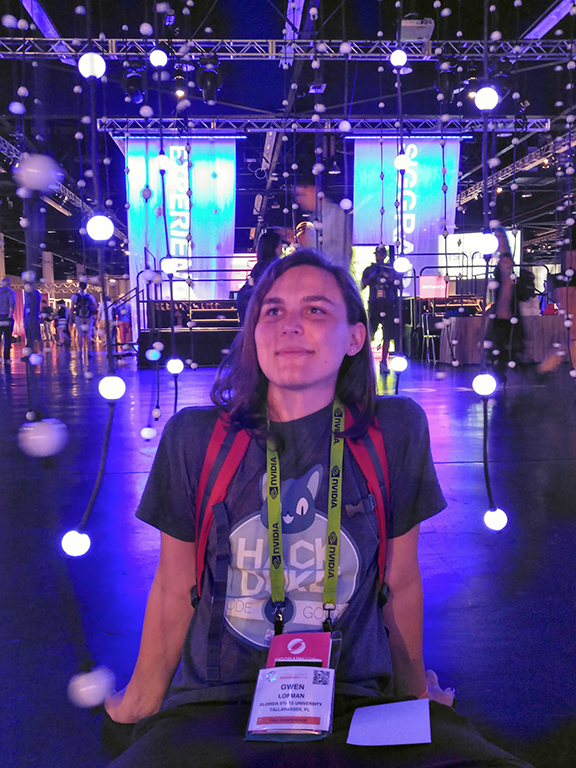Student Spotlight: Gwen Lofman
Gwen Lofman is pursuing a bachelor’s degree in computational science within the Department of Scientific Computing, part of the Florida State University’s College of Arts and Sciences. Lofman is also a computer programming intern in the FSU Innovation Hub as part of the InternFSU program.

Where are you from, and what is your anticipated graduation date?
I am from Miami and I expect to graduate this May.
How did you learn about the programs and opportunities, like working in the Innovation Hub, that you ended up receiving?
I've been a part of many opportunities that I discovered just by staying involved in extra-curricular activities. For example, I went to Michigan with a group of FSU students for a hackathon and met a lot of people from all around the country. From then on, I went to other hackathons which helped me get a great internship. I also found ways to take on projects or work with other students which got me noticed by faculty and got me on-campus jobs, such as the internship at the Innovation Hub.
Every opportunity spawned another. The people I met established meaningful relationships with me and we ended up having a desire to work together and help each other, to create a community.
What on-campus resources/departments or offices helped you?
The most consequential help I received was from the Department of Scientific Computing, Ken Baldauf and the Program for Interdisciplinary Computing group on campus. All provided me mentorship and gave me the visibility necessary to find opportunities on campus and beyond. Baldauf supported me when I was a sophomore focused on computer graphics and fostered my involvement in many areas of FSU, including some involvement in the actual planning and development of the Innovation Hub.
What aspect of working on campus do you find most exciting?
I really like working at the Innovation Hub [located in the Louis Shores building, the Innovation Hub offers students a space to collaborate on various projects and is an investment effort from the provost’s office to deepen FSU’s commitment to innovation] as a computer programming intern because it allows me to explore my areas of interest while aiding others. I get to help students with homework, create programs that are used in the day-to-day operations at the Hub, automate the deployments of our website, give workshops on topics in which I possess expertise and manage our version-control operations.
It’s unique to be able to work at a place as a student that not only provides agency, but also has an immediate, practical impact on the student community.
After you leave the Innovation Hub, what do you plan on doing or working on?
Though I am working through the job search, when I have time I would love to make a small, complete game. I'm focused on making roguelikes [a subgenre of role-playing games] as these sorts of games provide a lot of interesting challenges, but allow me, as a single programmer, to make a lot of content on my own. I'm especially interested in games that combine interesting physics and mechanics with themes relevant to everyday life, like a post-apocalyptic fire-fighting game based on the real-world effects of climate change.
What inspired you to choose your major or more specific research?
I started school as an applied math major, but quickly switched to computational science when I realized they teach a game design class, since that is what I want to do for a career.
Are there any faculty or staff that have helped or inspired you?
I have received a lot of generous assistance from many professors and staff including, but not limited to, Baldauf, scientific computing chair Gordon Erlebacher and professors Rienne Saludo and Tom Mikota. I met Saludo as a freshman and he provided me a lot of support when I ran a student organization [the now defunct Association for Computing Machinery Special Interest Group on Computer Graphics and and Interactive Techniques] and has continued to be a source of support in my projects at the Innovation Hub. Mikota allowed me to work with him on a variety of projects that combine my areas of interest in film production, real-time and interactive applications, and applied software engineering.
What do you like to do when you’re not doing schoolwork or research?
I spend my time working on open-source software, usually my own, and simple experiments with video game technology and game mechanics. I also try to figure-sculpt with oil and wax clay when I have time, and I enjoy playing “Settlers of Catan” with my roommates.
Although you might miss FSU, what are you looking forward to in your post-grad life?
I am looking forward to being able to focus on specific projects and being able to continue to learn from my peers but in a professional capacity. I'm hoping to secure a job at a top game studio. Working on and releasing a real game is also something to look forward to.

